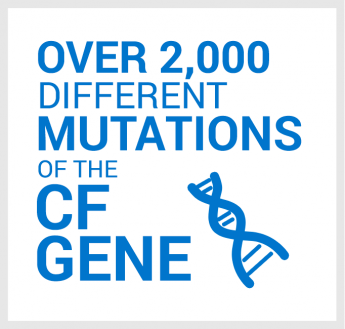CYSTIC FIBROSIS CANADA RELEASES CANADIAN CF REGISTRY 2020 ANNUAL DATA REPORT
New CF Trends Report finds a disease in transition
Toronto (February 25, 2022) – Today, Cystic Fibrosis Canada released its Canadian Cystic Fibrosis Registry 2020 Annual Data Report. The Canadian Cystic Fibrosis Registry has examined health outcomes for people living with cystic fibrosis (CF) across Canada since the 1970s. With the impact of the COVID-19 pandemic, advancements in treatments and access to new drugs, this year’s report shows that cystic fibrosis is a disease in transition.
New this year, Cystic Fibrosis Canada has also released a Trends Report, which explores trends that emerge from the data and what they might mean for cystic fibrosis in Canada. As treatments improve and people with cystic fibrosis live longer, three key trends are highlighted including nutrition and body mass trajectories for Canadians with cystic fibrosis, early introduction of the game changing drug, Trikafta, and a decrease in the number of lung transplants for people with cystic fibrosis.
“We are relieved to see in the data, that the COVID-19 pandemic doesn’t appear to have had significant immediate effects on health outcomes, including the estimated median age of survival for a Canadian born with cystic fibrosis,” said Dr. John Wallenburg, Chief Scientific Officer, Cystic Fibrosis Canada. “Still, the pandemic had an impact on the CF community as we saw the rise of virtual care and monitored a decrease in hospitalizations and lung transplants.”
This is the first year that the Canadian Cystic Fibrosis Registry tracked data related to Trikafta, as 28 children and 169 adults were recorded to be on the drug in 2020, likely through clinical trials or Special Access Programs. As of February 2022, Trikafta is approved for use in Canada and is publicly funded for those 12+ who meet eligibility requirements in all provinces and territories across Canada.
Key findings from the Canadian Cystic Fibrosis Registry’s 2020 Annual Data Report include:
- 4,332 people living with cystic fibrosis in Canada
- There were 87 new diagnoses, and 64 of these new diagnoses were identified through newborn screening
- 62% of people with cystic fibrosis were adults
- The median age of survival in 2020 was 55.4 years, a slight increase over the previous year, and even more promising when compared to the median age of survival twenty years ago of 35.5 years
- Individuals with cystic fibrosis attended over 18,000 in-person or virtual clinic visits and spent over 17,100 days in hospital, a substantial decrease from previous years, likely due to the COVID-19 pandemic and some people in the community starting Trikafta
- 34% of adults have CF-related diabetes
- 21 individuals received a lung transplant
“The Canadian Cystic Fibrosis Registry has made a remarkable impact on our understanding and treatment of the disease, and its importance continues. The data helps us to track trends in the Canadian CF community and understand the progress and impact that has been made to advance health outcomes,” said Kelly Grover, President and CEO at Cystic Fibrosis Canada. “We deeply value the information provided by the Canadian Cystic Fibrosis Registry and know how fortunate we are to have it. The Registry has been instrumental for Canadian cystic fibrosis research and care and has also been a tremendous tool for our advocacy efforts.”
The Canadian Cystic Fibrosis Registry (CF Registry) is a collection of national cystic fibrosis patient data used to support and improve our knowledge and understanding of CF. This extensive resource has been involved in many important studies resulting in achievements in improving health outcomes for those living with cystic fibrosis. Participating individuals who attend any of the accredited 42 CF clinics across Canada are represented in the CF Registry. Data are submitted by the CF clinics on behalf of patients. Given that most people living with CF attend one of these clinics, and nearly all consent to contributing their data, we are confident that the CF Registry includes data on virtually all Canadians diagnosed with cystic fibrosis — giving a comprehensive picture of the CF population in this country.
The Canadian Cystic Fibrosis Registry plays a pivotal role in supporting Cystic Fibrosis Canada’s programs including Cystic Fibrosis Canada’s Accelerating Clinical Trials network, where CF Registry data are used to help facilitate clinical trials and MyCFLifePortal, where patients at participating clinics can view their health data that is entered into the CF Registry.
Thank you to the clinic staff and the patients who contribute to the CF Registry and our donors, without your commitment and contributions, this incredible resource would not be possible.
-30-
About Cystic Fibrosis
Cystic fibrosis is the most common fatal genetic disease affecting Canadian children and young adults. There is no cure. Of the Canadians with cystic fibrosis who died in the past three years, half were under the age of 34. Cystic fibrosis is a progressive, degenerative multi-system disease that affects mainly the lungs and digestive system. In the lungs, where the effects are most devastating, a build-up of thick mucus causes severe respiratory problems. Mucus and protein also build up in the digestive tract, making it difficult to digest and absorb nutrients from food. In addition to the physical effects of the disease, mental health concerns are emerging; anxiety and depression are common among this population. Double lung transplants are the final option for patients with end-stage disease; most fatalities of people with CF are due to lung disease.
About Cystic Fibrosis Canada
Cystic Fibrosis Canada has dramatically changed the cystic fibrosis story. We have advanced research and care that has more than doubled life expectancy. Since being founded by parents in 1960, Cystic Fibrosis Canada has grown into a leading organization with a central role engaging people living with cystic fibrosis, parents and caregivers, volunteers, researchers and healthcare professionals, government and donors. We work together to change lives for the 4,344 Canadian children and adults living with cystic fibrosis through treatments, research, information and support. Despite our remarkable progress together, we are not yet done. Not when half of the Canadians with cystic fibrosis who died in the past three years were under the age of 34. We will keep pushing, keep going further until all people with cystic fibrosis can and do experience everything life has to offer —and enjoy everything life has to offer.
For more information, please contact:
Nicole Young, Director, Corporate Communications
Tel: 905 317-5529
Email:nyoung@cysticfibrosis.ca
Cateryne Rhéaume, National Bilingual Communications and Marketing Associate
Tel: 438 868 4451
Email: crheaume@fibrosekystique.ca




